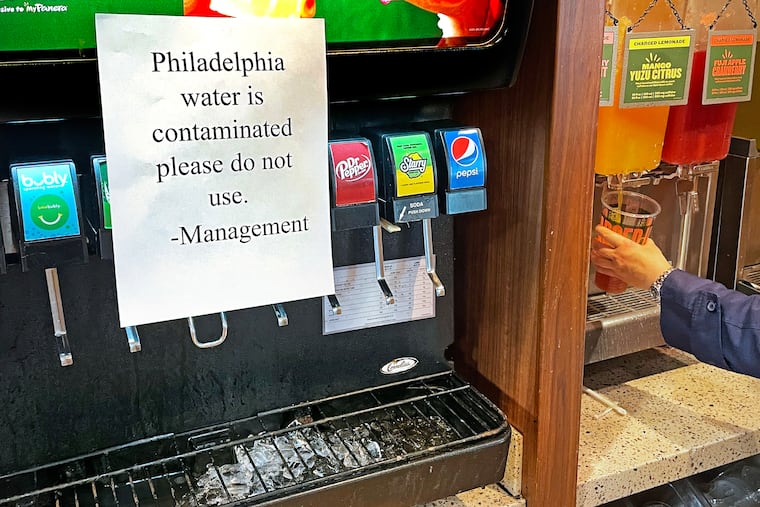On the 10th anniversary of the Flint water crisis, we still have a lot to learn
Yes, fixing old water pipes costs a lot of money. But so does doing nothing. Flint, Mich. — and now East Dunkard, Pa. — are proof.

Ten years ago, in the spring of 2014, the city of Flint, Mich., made a fateful decision that would soon threaten the health and safety of its residents. To save money, Flint officials switched their municipal water supply source from the water system in Detroit to the Flint River.
The new water wasn’t tested or treated properly, and, as a result, distribution pipes began to leach lead and other contaminants into residents’ drinking water. (Pediatrician Mona Hanna-Attisha was an early whistleblower in this crisis.)
The community’s plight became national news after it was discovered that the changes resulted in dangerous lead exposure for area residents and would cost millions of dollars in federal and state funding to fix. An outbreak of Legionnaires’ disease — a severe form of pneumonia caused by bacteria — killed at least 12 people (and maybe dozens more).
Of course, Flint is not the only place where residents suffer from poor water quality. Similar drinking water crises have emerged in Jackson, Miss., and throughout the U.S.
Including, of course, in our own backyard.
Last spring, my phone rang nonstop after news broke that chemicals had spilled into a Delaware River tributary, threatening Philadelphia’s water supply. Frightened families cleared out store shelves of bottled water until repeated tests detected no evidence of contamination, and then-Mayor Jim Kenney downed a glass of tap water at a news conference.
And now, unfortunately, some Pennsylvanians south of Pittsburgh are experiencing similar challenges.
For years, ongoing water quality and reliability issues have plagued customers of the government-run East Dunkard Water Authority. The community has faced numerous boil water advisories, and many were forced to buy bottled water because their tap water was unsafe to drink or cook with. A KDKA-TV news story from February depicted cloudy, brown water coming out of faucets; Damon Casseday, who lives in Greene Township, shared a harrowing experience of nearly losing his leg from sores he said developed as a result of bathing in unclean water.
As East Dunkard resident Clarissa Eggers told the Observer-Reporter, “It feels like we’re the Flint, Michigan of Pennsylvania.”
» READ MORE: Philadelphia’s water contamination was a test of the city’s response to a crisis. It failed. | Opinion
After receiving numerous citations from the state Department of Environmental Protection over the past two years, Pennsylvania’s Commonwealth Court recently ordered East Dunkard’s operations to be placed in the care of a private water company.
This happens all too often: A municipal system defers maintenance to avoid having to spend the money, leaving customers with bad water. In the end, private companies — which often have more expertise and the ability to make repairs more quickly — are asked to step in.
As this unfortunate scenario continues to play out in Pennsylvania and across the country, the federal government is trying to prevent the next water crisis. Later this year, the Environmental Protection Agency will require all water companies, whether they are run by the government or private companies, to map water service lines containing lead in efforts to expedite their replacement.
Last month, the Biden administration also issued the first-ever limits on PFAS, or “forever chemicals,” in the nation’s drinking water, which can accumulate in our bodies with prolonged exposure. The decision was largely hailed as a positive first step in combating this growing public health threat.
However, keeping drinking water safe by modernizing our nation’s aging pipes — including removing lead service lines and treating pollution from PFAS — cannot happen without significant investment.
The EPA estimates that improving drinking water infrastructure in Pennsylvania alone will cost more than $24 billion over the next two decades — only Florida, New York, Texas, and California need more. This is not a huge surprise: Pennsylvania’s water infrastructure is outdated and much older than that of other states. The average age of water pipes in the U.S. is nearly 50 years old, and they’re often older in cities like Philadelphia.
There’s a price we pay for deferring maintenance.
While Philadelphia will receive $160 million in federal funding (via the Biden administration’s bipartisan infrastructure law) to help upgrade the city’s water infrastructure and replace lead service lines, that amount barely scratches the surface of the funding necessary to make these overdue improvements across Pennsylvania.
Looming over all of these changes is the scary reminder of the Flint water crisis. It comes as Pennsylvania lawmakers and regulators have renewed discussion on proposed rate increases from water companies.
Yes, fixing old water pipes costs a lot of money. But so does doing nothing.
If there’s one lesson the water crises in Flint and East Dunkard have taught us, it is that there’s a price we pay for deferring maintenance when critical investments are long overdue. Yes, there may be a cost to consumers in the short term, but smart infrastructure investments will protect public health and ensure access to clean drinking water. This benefits all Pennsylvanians in the long run.
If we make smart investments today, we can stay out of national headlines tomorrow. More importantly, we will sleep better knowing our water is safe, clean, and reliable.
Subodha Kumar is a distinguished professor at Temple University’s Fox School of Business.